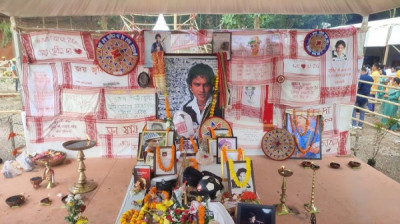Detailed Notes
Today, his final resting place at Kamar Kuchi in Sonapur, about 20 km from Guwahati, has transformed into something far greater than a burial site — it has become a spiritual shrine, a living symbol of the people’s affection and devotion toward their beloved icon.
From Mourning to Pilgrimage: A Place of Reverence
In the weeks following his passing in September 2024, thousands of people from every corner of Assam — and even from neighboring states — traveled to Sonapur. They came not only to mourn but to celebrate the life of a man who gave Assam its modern musical soul.
Fans brought flowers, candles, and traditional Assamese offerings like gamosas and xarai. Over time, the site became more organized, with pathways, small structures, and a constant flow of visitors — transforming naturally into a pilgrimage site for admirers of Zubeen Garg.
Locals now refer to it as a “Zubeen Dham”, where music lovers come to pay homage, offer prayers, and feel spiritually connected to the artist whose voice once united millions.
A Shrine Born from People’s Love
The transformation was not orchestrated by any government or organization — it was entirely people-driven. Fans themselves began maintaining the area, lighting lamps every evening, singing Zubeen’s songs, and sharing emotional tributes online.
The outpouring of love and grief was so overwhelming that even weeks later, the crowds didn’t thin. Roads leading to Sonapur witnessed long lines of vehicles every day as people made their way to what is now being called “Zubeen Garg’s Shrine.”
For many, visiting the site feels like meeting him spiritually — a way to express gratitude for his music, courage, and humanity.
Zubeen Garg’s Legacy and Symbolism
Zubeen Garg was not just an artist — he was a voice of the people. He stood for inclusiveness, secularism, and courage. From speaking up for the marginalized to challenging powerful figures, Zubeen lived by his principles.
-
He sang across languages, bridging cultural gaps between Assamese, Bengali, and Hindi audiences.
-
He stood against extremism, openly defying bans and promoting peace.
-
He spoke for the youth, motivating generations through his fearless songs and performances.
His burial site becoming a shrine is, therefore, symbolic — a reflection of how deeply his values resonated with the people of Assam. The transformation signifies not just devotion to a celebrity, but respect for a cultural hero who dared to dream and speak for his people.
Comparison to Bhupen Hazarika’s Legacy
Old-timers in Assam recall a similar outpouring of grief when the legendary Dr. Bhupen Hazarika passed away in 2011. Yet, Zubeen’s shrine stands out as a grassroots phenomenon of modern times - born in the era of social media, digital tributes, and collective cultural expression.
The unity, peace, and emotional intensity surrounding Zubeen Garg’s resting place demonstrate how art can transcend life itself.
Cultural and Emotional Impact on Assam
Zubeen Garg’s passing brought together communities that had long been divided by social, linguistic, and political lines. His music continues to play in homes, temples, cafes, and community halls.
For Assam, this transformation represents something larger — a rebirth of emotional unity.
-
It shows how art binds people beyond caste, religion, or region.
-
It proves that true artists never die; they become immortal in people’s hearts.
-
It highlights how collective emotion can turn grief into spiritual strength.
The Shrine as a Symbol of Assam’s Identity
Today, when travelers visit Assam, locals often guide them not only to Kamakhya Temple or the mighty Brahmaputra River but also to Sonapur’s Kamar Kuchi, where Zubeen rests.
His shrine has joined Assam’s cultural map — a place of love, music, and memory. Visitors leave behind flowers, music notes, and sometimes handwritten letters — thanking Zubeen for shaping their lives with his songs.
The site has also become a hub for young musicians and fans, who gather to sing his songs and keep his message alive. It’s not merely a place of mourning - it’s a place of inspiration, where art meets eternity.
Conclusion: The Immortality of Zubeen Garg
Zubeen Garg’s final resting place at Sonapur has metamorphosed into more than a shrine — it is a living monument of Assam’s collective soul. What began as a site of grief has evolved into a space of hope, reflection, and unity.
For every Assamese, Zubeen remains more than a singer; he is a symbol of resilience, inclusiveness, and unending love. His shrine is not just a destination - it is a reminder that great souls never die; they continue to guide and heal generations through their art.
